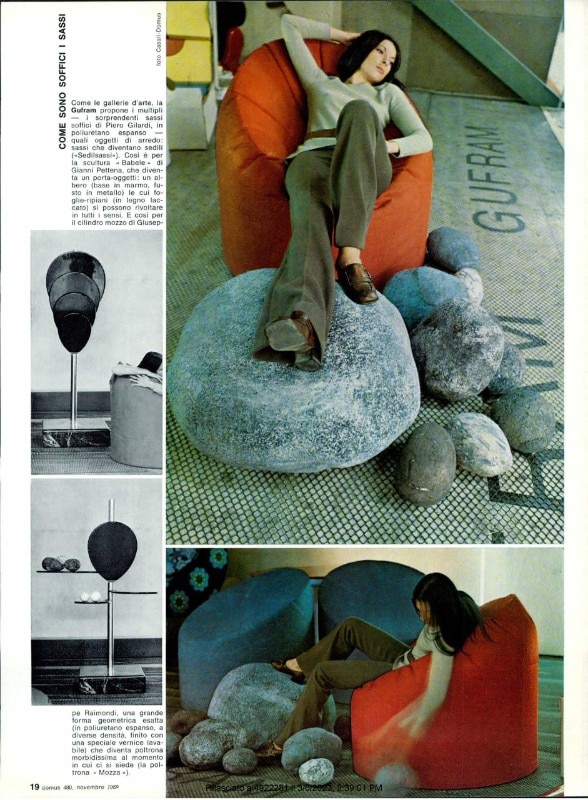“It seems to me that Gilardi is somehow convinced to be capable of predicting and announcing what is going to happen, as he says in all his exhibition catalogues: ‘Summary projects represent a summary solution of the fundamental needs of man in the near future.' (...) Gilardi's nature is neither hygienic nor comfortable. It is not an alibi, it is a ritual. It is a miserable nature at a loss. A nature of fallen apples, of suburban garden pumpkins caught when the happy flowers of peas and beans, zinnias and dahlias have bloomed and the fruits have been harvested,(...) a nature at a loss. Gilardi's ritual is like the ritual in the caves of Lascaux: it is the rite (...) to invoke courage before death by reconstructing with our poor hands the adventure of defeat." This is how Ettore Sottsass introduced Piero Gilardi's work to Domus readers in December 1966 on issue 445, commenting his polyurethane Tappeti-Natura (Nature-carpets).
But the Turin-based artist, who passed away on March 5 at the age of 80, since that 1966 has instead built a totally opposite trajectory with no concession to an idea of preventive defeat, dedicating his work to an incisive and continuous action of raising the collective awareness towards the damages harming the global ecosystem, and towards all active possibilities of getting out of such self-destructive spiral swallowing the realm of the living: this is witnessed by the artist’s land art works as well as by all the research and activity he would then carried out since the foundation of the Parco Arte Vivente (Park of Living Art) in Turin.
And Gilardi himself would tell this to Lea Vergine in February 1981, on issue 614 of Domus, in an interview blending a retrospective view with a critical dialogue.
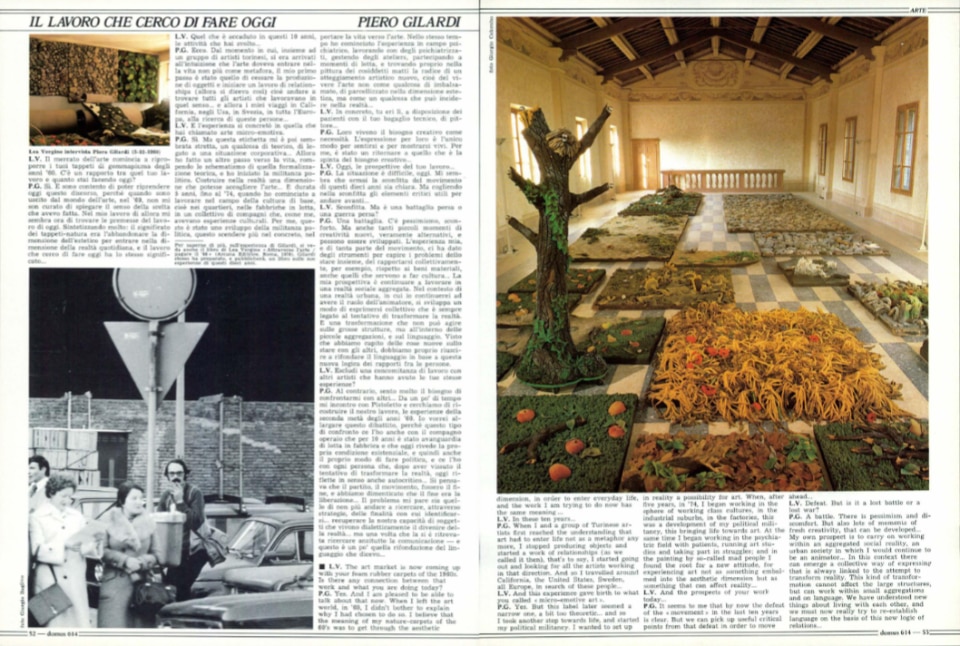
[...] for experiencing art not as something embalmed into the aesthetic dimension but as something that can affect reality...
The work I am trying to do now, Piero Gilardi
L.V. The art market is now coming up with your foam rubber carpets of the 1960s. Is there any connection between that work and what you are doing today?
P.G. Yes. And I am pleased to be able to talk about that now. When I left the art world, in '69, I didn't bother to explain why I had chosen to do so. I believe that the meaning of my nature-carpets of the 60's was to get through the aesthetic dimension, in order to enter everyday life, and the work I am trying to do now has the same meaning...
L.V. In these ten years...
P.G. When I and a group of Turinese artists first reached the understanding that art had to enter life not as a metaphor anymore, I stopped producing objects and started a work of relationships (as we called it then), that's to say, I started going out and looking for all the artists working in that direction. And so I travelled around California, the United States, Sweden, all Europe, in search of these people...
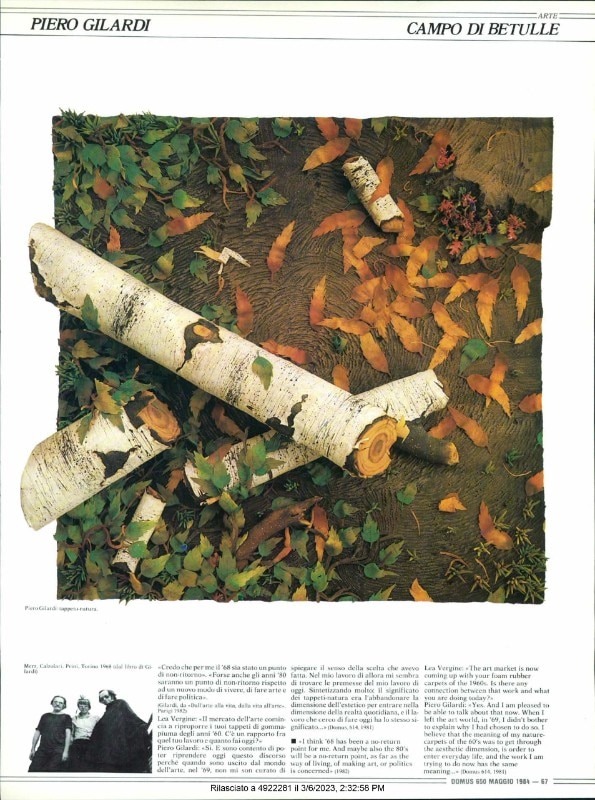
We got to the point of thinking that the party, the movement, was a goal in itself, and we forgot that the goal was liberation...
L.V. And this experience gave birth to what you called “micro-emotive art”.
P.G. Yes. But this label later seemed a narrow one, a bit too theoretic... and so I took another step towards life, and started my political militancy. I wanted to set up in reality a possibility for art. When, after five years, in '74, I began working in the sphere of working class cultures, in the industrial suburbs, in the factories, this was a development of my political militancy, this bringing life towards art. At the same time I began working in the psychiatric field with patients, running art studios and taking part in struggles; and in the painting by so-called mad people I found the root for a new attitude, for experiencing art not as something embalmed into the aesthetic dimension but as something that can affect reality...
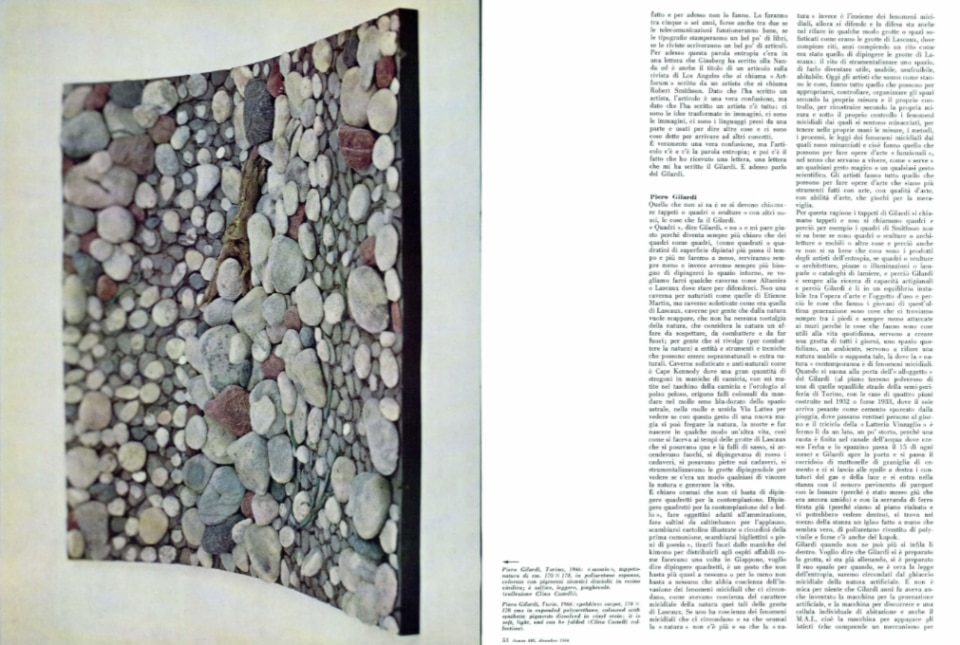
L.V. Specifically, you were there, available to patients with your technical background, as a painter...
P.G. They experience the creative need as a necessity. Expression for them is the only way to feel and to show themselves as living. To me, it was a return to the real drive of creative need....
L.V. And the prospects of your work today...
P.G. It seems to me that by now the defeat of the “movement” in the last ten years is clear. But we can pick up useful critical points from that defeat in order to move ahead...
L.V. Defeat. But is it a lost battle or a lost war?
P.G. A battle. There is pessimism and discomfort. But also lots of moments of fresh creativity, that can be developed... My own prospect is to carry on working within an aggregated social reality, an urban society in which I would continue to be an animator... In this context there can emerge a collective way of expressing that is always linked to the attempt to transform reality. This kind of transformation cannot affect the large structures, but can work within small aggregations and on language. We have understood new things about living with each other, and we must now really try to re-establish language on the basis of this new logic of relations..
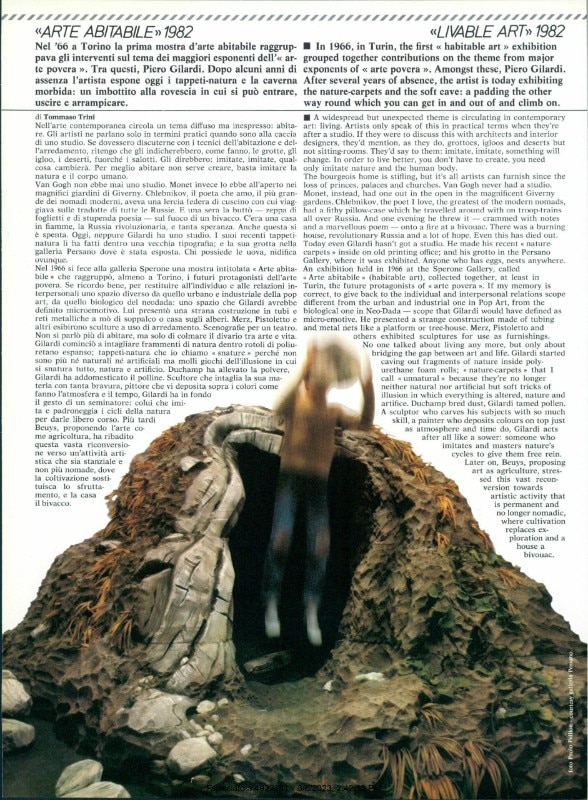
I believe that the meaning of my nature-carpets of the 60's was to get through the aesthetic dimension, in order to enter everyday life, and the work I am trying to do now has the same meaning...
L.V. Do you exclude a concurrence of work with other artists who have had the same experiences as you?
P.G. Not at all, I feel very much the need to compare myself with others instead.... I have been meeting with Pistoletto for some time now and we have been trying to reconstruct our work, the experiences of the second half of the 60s. I would like to broaden this debate, since I have this same kind of exchange with the comrade worker who has been the on the frontline fight in the factory for ten years and today is revising his own existential condition, his own way of doing politics therefore; and I have it with every person who, after having experienced the attempt to transform reality, today is having those same self-critical reflections as well... We got to the point of thinking that the Party, the movement, was a goal in itself, and we forgot that the goal was liberation.... The problem seems to me to be that we no longer go in search, through strategies, of goals with which to identify ourselves.... it is about recovering our capacity as subjects who dialectically experience the becoming of reality... but once it has been found, it is about seeking first and foremost communication – and this is a bit of that refounding of language that I was saying..
